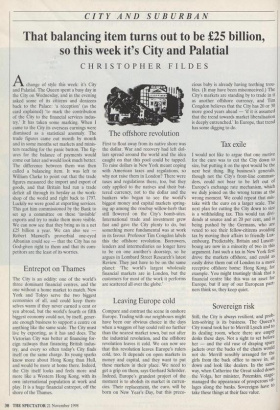The offshore revolution
First to float away from its native shore was the dollar. War and recovery had left dol- lars spread around the world and the idea caught on that this pool could be tapped. To raise dollars in New York meant coping with American taxes and regulations, so why not raise them in London? There were taxes and regulations there, too, but they only applied to the natives and their bat- tered currency, not to the dollar and the bankers who began to see the world's biggest money and capital markets spring- ing up among the rosebay willow-herb that still flowered on the City's bomb-sites. International trade and investment grew fast and gave the City plenty to do, but something more fundamental was at work in its favour. Professor Tim Congdon labels this the offshore revolution. Borrowers, lenders and intermediaries no longer have to be on one another's doorstep, so he argues in Lombard Street Research's latest Review. They just have to be on the same planet: 'The world's largest wholesale financial markets are in London, but the customers for most of the work it performs are scattered all over the globe.'


















































































 Previous page
Previous page